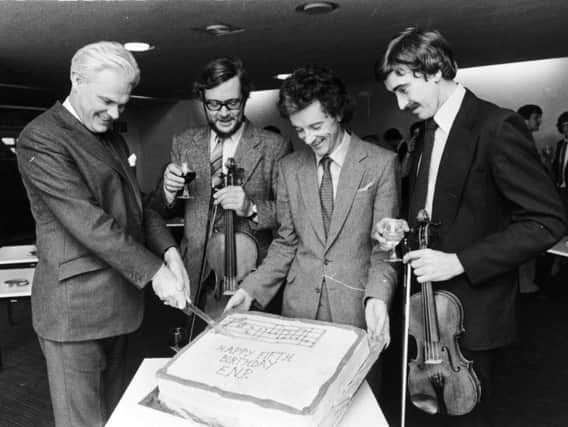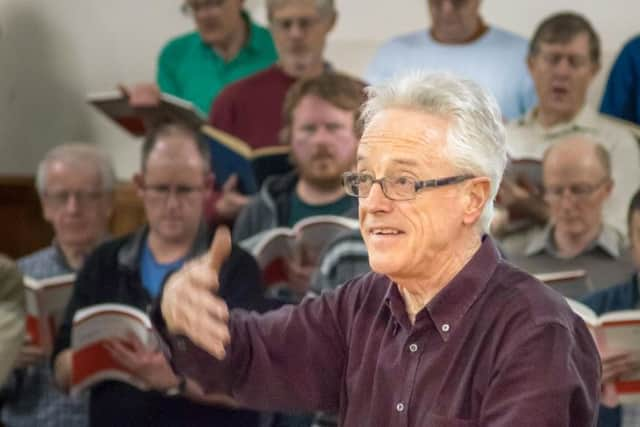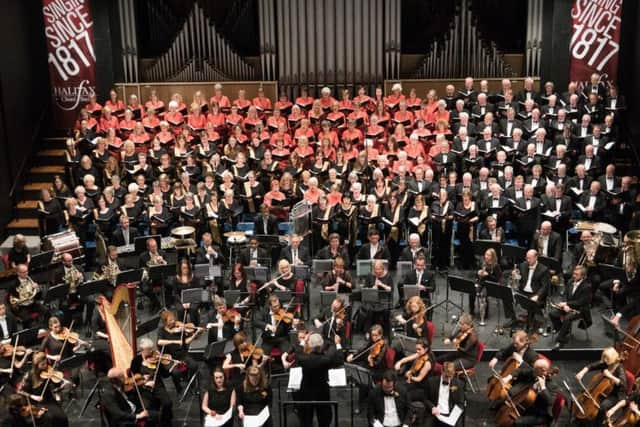Conductor John Pryce-Jones looks back on career with Northern Ballet and Opera North as he prepares for final concert with Halifax Choral Society


Conductor John Pryce-Jones has a unique string to his bow. “There is nobody else in the world who was conducting a choral society for its 200th anniversary,” he says, “because, as far as we know, there isn’t another one [that has turned 200].”
The 73-year-old led Halifax Choral Society in its bicentenary season in 2017-18. Two years later, he is retiring from the group, marking the end of an illustrious career that has seen him work with the likes of Opera North, Northern Ballet and Scottish Opera.
Advertisement
Hide AdAdvertisement
Hide Ad“I have been very lucky to have always been in work, doing the things for which I have a talent and a flare. Not everybody has that privilege,” he says.


“When you tell people, in the street as it were, what you do, they say ‘wow that must be fantastic’. Well, yes it is fantastic but every job, whether you’re a journalist, a doctor, a nurse, whatever, has its high points and its low points.
“If all I had to do was stand up, perform and conduct, it could be mega fantastic, but you go through a lot of hard work, self doubt and dealing with a lot of people who are emotionally exposed all the time, which is difficult. But, probably, the rewards are greater than in some other careers.”
Pryce-Jones, who grew up in South Wales, started piano lessons at the age of five. His parents were musical - his father played the church organ - but not professionals, with ‘day jobs’ as a local government officer and a housewife.
Advertisement
Hide AdAdvertisement
Hide AdClassical: Two centuries of songStill, they encouraged him musically and Pryce-Jones secured a music scholarship at Worcester Royal Grammar School in his teens. There, he became involved in several choirs and first turned his hand to conducting.


Pryce-Jones then spent four years at Corpus Christi College in Cambridge with an organ scholarship, before taking his first job as an assistant chorus master with Welsh National Opera. “I conducted my first opera there,” he recalls. “One of the first one was Aida, which started my great love of Italian operas particularly Verdi.”
It is rather fitting that his final performance with Halifax Choral Society next month will take him full circle. Joined by Glasgow’s Bearsden Choir, the group, believed to the world’s oldest amateur choral society, making music continuously since 1817, will perform Verdi Requiem to mark his farewell. Conductor and music director, he joined the society in 1988, two years after making a guest appearance.
“Until I joined the Welsh National Opera Company in 1968, I had worked a lot with non-trained singers,” Pryce-Jones says. “But then from 1968 to 1986, it was only with professional opera singers. Coming back to amateur singers was quite a shock but I began to realise that it was equally fulfilling to work with relatively or completely untrained singers, who had less or no preconceptions of singing technique.
Advertisement
Hide AdAdvertisement
Hide Ad“I am passionate about voices and singing technique - the latter is a controversial art but thanks to a wonderful teacher and friend, Gerald Wragg, I have had great success helping and improving singers both trained and untrained of almost all ages. This has made my long association with the choral society hugely rewarding.”
After seven years at the Welsh National Opera Company, Pryce-Jones had spent more than two years conducting opera and ballet in South Africa, before then becoming the founder chorus master with Leeds-based Opera North.
Meet the police dog getting his teeth into new role tackling South Yorkshire criminals“We auditioned hundreds of singers and my colleagues auditioned even more hundreds of instrumentalists for the orchestra,” Pryce-Jones recalls. “It was a great privilege because there are few people involved in their lives with the formation of a major opera company...
“The amazing thing was that already when we started we had more ‘friends’ than some other opera companies had after years. There was huge enthusiasm for this in Leeds.”
Advertisement
Hide AdAdvertisement
Hide AdEstablished as English National Opera North, the company held its first production, of Saint-Saëns’s Samson et Dalila, in 1978. The opening performance was broadcast live on BBC Radio 3 and both the success of opening night and the emergence of the company were referred to by the press as “a near miracle”.
“On the first night, there were telegrams from all over the world - the Met in New York, the Royal Opera House in London and so on and so forth because it was a major event. The atmosphere [for the first show] was electric, just amazing.
“There were so many people in the area who wanted the company to come and succeed, so enormous enthusiasm and a fantastic reception. It was very exciting.”
At around the same time that Pryce-Jones joined Halifax Choral Society, he accepted a post as head of music at Scottish Opera. Each Monday evening, he would drive down from Glasgow for choral rehearsals in Halifax and on one occasion had a near miss with the plane involved in the Lockerbie disaster.
Advertisement
Hide AdAdvertisement
Hide Ad“We were driving down one Monday and the plane crashed about an hour at the most later, injuring people on the motorway as well [as those on board]”, he recalls. “We would have been caught up in it.”
After his time in Scotland, Pryce-Jones joined the D’Oyly Carte Opera Company and then became music director with Northern Ballet, only retiring from the company after 27 years, earlier this year.
Forgotten footage traces Bradford’s history through a century of filmmakingHis time there took him overseas to destinations including Turkey, Australia, Italy and Hong Kong and throughout his career, he has travelled across all corners of Britain. “I think I’ve conducted in nearly every theatre in Britain that is big enough to have an orchestra or ballet or opera company,” he says.
With wife Alison, who trained at the Royal Northern College of Music and became a singer and teacher, Pryce-Jones will spend his retirement on the Spanish Balearic Island of Mallorca, though he still plans to appear in some UK productions.
Advertisement
Hide AdAdvertisement
Hide AdThe couple have recently done their last concert with the project they are perhaps most proudest to have been involved in - the Yorkshire Youth Choir, of which they were joint artistic directors.
“In many ways, it has been the thing that Alison and I are most proud of because it has, in their own words, been life changing for all the young singers that have passed through it."
Young people attend twice a year for week-long residential courses and have formed lifelong friendships. “We knew we could form a really good choir,” he says. “But we didn’t realise what good was going to come from it in other ways.”
Pryce-Jones will conduct Verdi Requiem at The Victoria Theatre, Halifax on October 13. Visit halifaxchoralsociety.co.uk